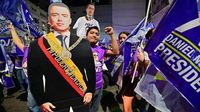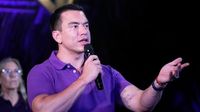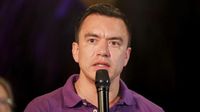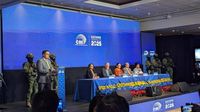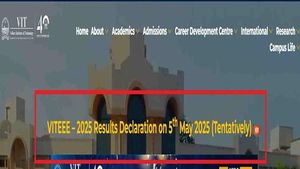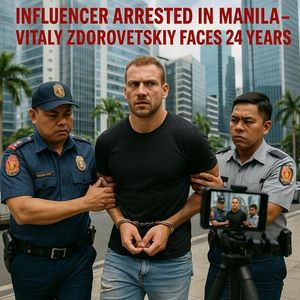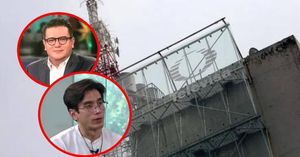On April 14, 2025, Ecuador confirmed Daniel Noboa as its president, marking a significant moment in the South American nation’s political landscape. After the Ecuadorian Electoral Council declared an "irreversible trend" at 22:30 Quito time, it became clear that Noboa had secured his position with a substantial lead. With over 90% of the votes counted, Noboa, representing the right-wing party Acción Democrática Nacional, held a commanding advantage of 1.1 million votes over his rival, Luisa González.
As the results rolled in, it became evident that Noboa obtained 55.87% of the votes, while González garnered 44.13%. Celebrating what he described as a "historical victory," Noboa addressed supporters from his home in Olón, a coastal town about 50 kilometers from Guayaquil. "This victory is historical, a victory of over 10 points," he proclaimed, expressing confidence that there was no doubt about the election's outcome.
However, González, a member of the leftist party Revolución Ciudadana and considered a protégé of former president Rafael Correa, rejected the results. In a passionate speech delivered in front of her supporters, who chanted accusations of fraud, she demanded a recount of the votes and an opening of the ballot boxes. "I refuse to believe that there is a people who prefer violence and lies," she stated, adding that "about 11 polls gave us the victory, as well as an exit poll." She characterized the situation in Ecuador as a dictatorship and declared it the "most grotesque electoral fraud in its history."
Former President Correa echoed González's sentiments, stating, "Everyone knows that these results are impossible. We obtained the same 44% as in the first round. These mafiosos could have pretended to be a bit more discreet." This marks the third consecutive defeat for Correa's party, which has struggled to regain the presidency since his administration ended in 2017.
Noboa, who first took office in October 2023 at the age of 37, became the youngest president in Ecuador's history after winning early elections that followed the chaotic resignation of his predecessor, Guillermo Lasso. His tenure has been marked by significant challenges, including a national emergency declaration and the initiation of the "Plan Fenix," aimed at combatting the rampant criminal activities of gangs and drug traffickers. This approach has drawn both support and criticism, with allegations of human rights violations and extrajudicial killings surfacing amidst the crackdown on crime.
During his brief time in office, Noboa has been active in addressing the country's complex security issues, which have resonated with voters despite the controversies surrounding his methods. His policies have reportedly led to a decrease in the homicide rate, though the underlying problems remain deeply entrenched. In his second term, he has promised to continue implementing similar tough-on-crime strategies.
In the first round of elections held on February 9, 2025, Noboa narrowly defeated González by a margin of just 17,000 votes, receiving 44.3% of the votes compared to her 43.8%. The close nature of that race set the stage for a highly competitive runoff, and both candidates had pledged to adopt stringent measures against crime, albeit with differing visions for the country’s future.
As Noboa celebrated his victory, he faced internal challenges as well, including a lengthy dispute with his vice president, Verónica Abad. He hails from a wealthy family known for its banana trade, and his economic policies lean towards free market principles and reducing state intervention.
The aftermath of the election has drawn international attention, with Luis Almagro, Secretary General of the Organization of American States (OAS), congratulating Noboa and affirming that the OAS would monitor subsequent institutional processes. Almagro stated, "Based on the data presented by the CNE and what I was informed by the head of the OAS mission in Ecuador, we congratulate Daniel Noboa for his victory in the second round of the presidential elections of 2025. We will monitor any further institutional processes that may arise."
Responses from other Latin American leaders have been varied. The presidents of Paraguay, Guatemala, and Peru have expressed their congratulations to Noboa. Paraguayan President Santiago Peña stated he had spoken with Noboa, reaffirming a commitment to collaborate for the benefit of their peoples. Similarly, Guatemalan President Bernardo Arévalo noted that the Ecuadorian people voted "freely" and wished Noboa the best in his new term.
In contrast, González's refusal to accept the election results has ignited further political tension. The mayor of Guayaquil, Aquiles Álvarez, and other local politicians congratulated Noboa, emphasizing that the election was a victory for democracy. Opposition leader Maria Corina Machado from Venezuela also remarked, "Ecuador has won, the Americas have won, freedom and democracy have triumphed."
As the dust settles on this contentious election, the future of Ecuador remains uncertain. With Noboa poised to take on another four years in office, the nation will closely watch how he navigates the challenges ahead, particularly in maintaining security and addressing the concerns raised by his opponents.
